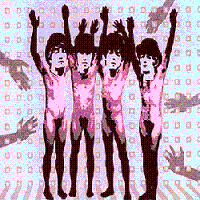
Help! is the fifth studio album by the English rock band the Beatles and the soundtrack to their film of the same name. It was released on 6 August 1965 by Parlophone. Seven of the fourteen songs, including the singles "Help!" and "Ticket to Ride", appeared in the film and take up the first side of the vinyl album. The second side includes "Yesterday", the most-covered song ever written. The album was met with favourable critical reviews and topped the Australian, German, British and American charts.
The Beatles Anthology is a multimedia retrospective project consisting of a television documentary, a three-volume set of double albums, and a book describing the history of the Beatles. Beatles members Paul McCartney, George Harrison and Ringo Starr participated in the making of the works, which are sometimes referred to collectively as the Anthology project, while John Lennon appears in archival interviews.
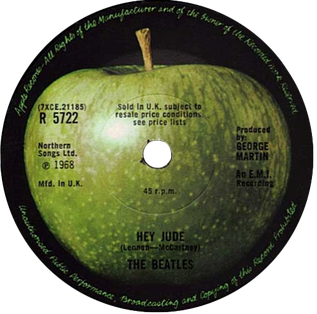
"Hey Jude" is a song by the English rock band the Beatles that was released as a non-album single in August 1968. It was written by Paul McCartney and credited to the Lennon–McCartney partnership. The single was the Beatles' first release on their Apple record label and one of the "First Four" singles by Apple's roster of artists, marking the label's public launch. "Hey Jude" was a number-one hit in many countries around the world and became the year's top-selling single in the UK, the US, Australia and Canada. Its nine-week run at number one on the Billboard Hot 100 tied the all-time record in 1968 for the longest run at the top of the US charts, a record it held for nine years. It has sold approximately eight million copies and is frequently included on music critics' lists of the greatest songs of all time.

"From Me to You" is a song by the English rock band the Beatles that was released in April 1963 as their third single. It was written by John Lennon and Paul McCartney. The song was the Beatles' first number 1 hit on what became the official UK singles chart but the second, after "Please Please Me", on most of the other singles charts published in the UK at the time. "From Me to You" failed to make an impact in the United States at the time of its initial release. Instead, a 1963 cover version released by Del Shannon resulted in the song's becoming the first Lennon–McCartney track to enter the US pop charts. The Beatles' original was re-released in the US in January 1964 as the B-side to "Please Please Me", and reached number 41.
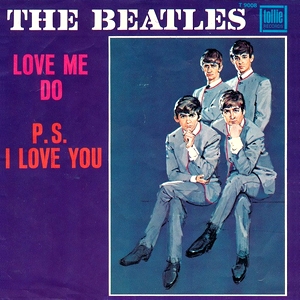
"Love Me Do" is the debut single by the English rock band the Beatles, backed by "P.S. I Love You". When the single was originally released in the United Kingdom on 5 October 1962, it peaked at number 17. It was released in the United States in 1964 and topped the nation's song chart. Re-released in 1982 as part of EMI's Beatles 20th anniversary, it re-entered the UK charts and peaked at number 4. "Love Me Do" also topped the charts in Australia and New Zealand.
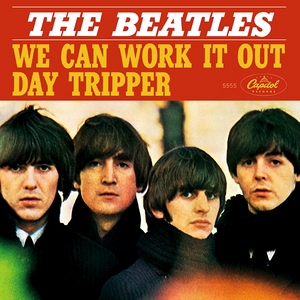
"We Can Work It Out" is a song by the English rock band the Beatles, written by Paul McCartney and John Lennon. It was first issued as a double A-side single with "Day Tripper" in December 1965. The song was recorded during the sessions for the band's Rubber Soul album. The single reached number one in Britain, the United States, Australia, Canada, and Ireland. In the UK, it was the seventh highest selling single of the 1960s.

"You Won't See Me" is a song by the English rock band the Beatles from their 1965 album Rubber Soul. It was written by Paul McCartney and credited to Lennon–McCartney. As with songs such as "We Can Work It Out" and "I'm Looking Through You" from the same period, the lyrics address McCartney's troubled relationship with Jane Asher and her desire to pursue her career as a stage and film actress. The Beatles recorded the song during what author Mark Lewisohn describes as a "marathon" final recording session for Rubber Soul, to ensure the album's pre-Christmas release.

"Day Tripper" is a song by the English rock band the Beatles that was released as a double A-side single with "We Can Work It Out" in December 1965. The song was written primarily by John Lennon with some contributions from Paul McCartney and was credited to the Lennon–McCartney partnership. Both songs were recorded during the sessions for the band's Rubber Soul album. The single topped charts in Britain, Ireland, the Netherlands and Norway. In the United States, "Day Tripper" peaked at number five on the Billboard Hot 100 chart and "We Can Work It Out" held the top position.

"Thank You Girl" is a song recorded by the English rock band the Beatles, written by John Lennon and Paul McCartney. It was issued as the B-side of the single "From Me to You", which was recorded on the same day. While not released on an LP in the United Kingdom until Rarities in 1978, the song was the second track on The Beatles' Second Album in the United States. As the B-side of the single "Do You Want to Know a Secret", it hit No. 35 on the Billboard Hot 100 in the spring of 1964.

"Please Please Me" is a song by the English rock band the Beatles. It was their second single in the United Kingdom, and their first in the United States. It is also the title track of their first LP, which was recorded to capitalise on the success of the single. It is a John Lennon composition, although its ultimate form was significantly influenced by producer George Martin.
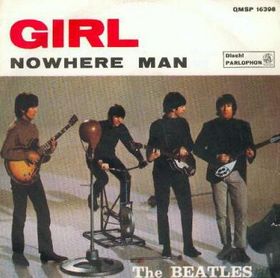
"Girl" is a song by the English rock band the Beatles from their 1965 album Rubber Soul. It was written by John Lennon and credited to Lennon–McCartney. "Girl" was the last complete song recorded for that album. "Girl" is considered to be one of the most melancholic and complex of the Beatles' earlier love songs.
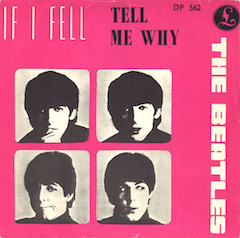
"Tell Me Why" is a song by English rock band the Beatles from their album A Hard Day's Night. In North America, it was released on both the American version of A Hard Day's Night and the album Something New. Credited to Lennon–McCartney, it was written by John Lennon in either Paris or New York City, and recorded in eight takes on 27 February 1964.

"P.S. I Love You" is a song recorded by English rock band the Beatles in 1962. It was composed principally by Paul McCartney, and produced by Ron Richards. The song was released in the UK on 5 October 1962 as the B-side of their debut single "Love Me Do" and is also included on their debut album Please Please Me (1963). It was later included on the American release Introducing... The Beatles (1964), its reissue The Early Beatles (1965), and the Beatles compilation album Love Songs (1977).
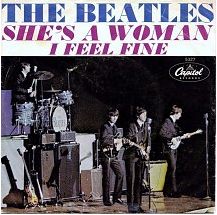
"She's a Woman" is a song by the English rock band the Beatles, written primarily by Paul McCartney and credited to Lennon–McCartney. It was released on a non-album single in November 1964 as the B-side to "I Feel Fine", except in North America, where it also appeared on the album Beatles '65, released in December 1964. Though it was the B-side, it charted in the US, reaching number four on the Billboard Hot 100 and number eight on the Cash Box Top 100. The song originated in McCartney's attempt to write a song in the style of Little Richard. The lyrics include the first reference to drugs in a Beatles song, with the line "turn(s) me on" referring to marijuana.
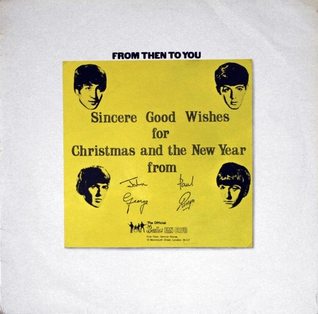
From December 1963 to December 1969, English rock group the Beatles sent out spoken and musical messages on flexi disc to members of their official fan clubs in the United Kingdom (UK) and the United States (US) each Christmas. An LP compilation of all seven, titled From Then to You in the UK and The Beatles Christmas Album in the US, was sent out in 1970.
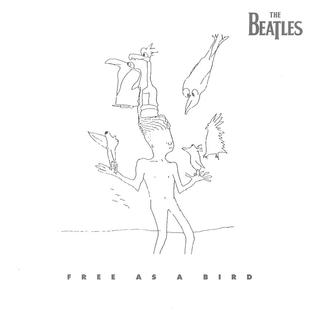
"Free as a Bird" is a single released in December 1995 by English rock band the Beatles. The song was originally written and recorded in 1977 as a home demo by John Lennon. In 1995, 25 years after their break-up and 15 years after Lennon's murder, his then surviving bandmates Paul McCartney, George Harrison and Ringo Starr released a studio version incorporating the demo.

The Music of Lennon & McCartney is a 1965 British television special honouring the songwriting partnership of John Lennon and Paul McCartney of the English rock band the Beatles. It was produced by Granada Television and aired on that station on 16 December 1965 before receiving a national broadcast across the entire ITV network, of which Granada was a part, the following evening. The programme mainly consisted of other artists miming to their recordings of Lennon–McCartney songs, interspersed with scripted commentary from Lennon and McCartney. In addition, the Beatles performed both sides of their current single, "Day Tripper" and "We Can Work It Out". Peter Sellers performed a comedic interpretation of "A Hard Day's Night", in the style of stage actor Laurence Olivier's portrayal of Richard III.
"Grow Old with Me" is one of the final songs written by John Lennon. It was first recorded by Lennon as a demo while in Bermuda. A handwritten lyric sheet for the song is dated July 5, 1980 Fairyland Bermuda. The song was first released on the posthumous album Milk and Honey in 1984. It was also rumored to be among the songs planned as a possible reunion single by his former bandmates during the making of The Beatles Anthology.
The Beatles Anthology is a documentary television series on the career of the Beatles. It was broadcast on UK television in six parts on ITV between 26 November and 31 December 1995, while in the United States it was seen as three feature-length episodes on ABC between 19 and 23 November 1995. It was released in greatly expanded form as an eight-volume VHS set and an eight-disc LaserDisc set on 5 September 1996. The series was re-released on DVD in 2003, with an 81-minute special-features disc.

"Komm, gib mir deine Hand" and "Sie liebt dich" are German-language versions of "I Want to Hold Your Hand" and "She Loves You", respectively, by the English rock band the Beatles. Both John Lennon and Paul McCartney wrote the original English songs, credited to the Lennon–McCartney partnership, while Camillo Felgen wrote the translated German lyrics. Felgen is credited under several of his pen names. In places, his translations take major liberties with the original lyrics. Odeon Records released the German versions together as a non-album single in West Germany in March 1964. Swan Records released "Sie liebt dich", along with the original "She Loves You" B-side "I'll Get You", as a single in the United States in May 1964. Capitol included "Komm, gib mir deine Hand" as the closing track of the 1964 North American-only album Something New.
